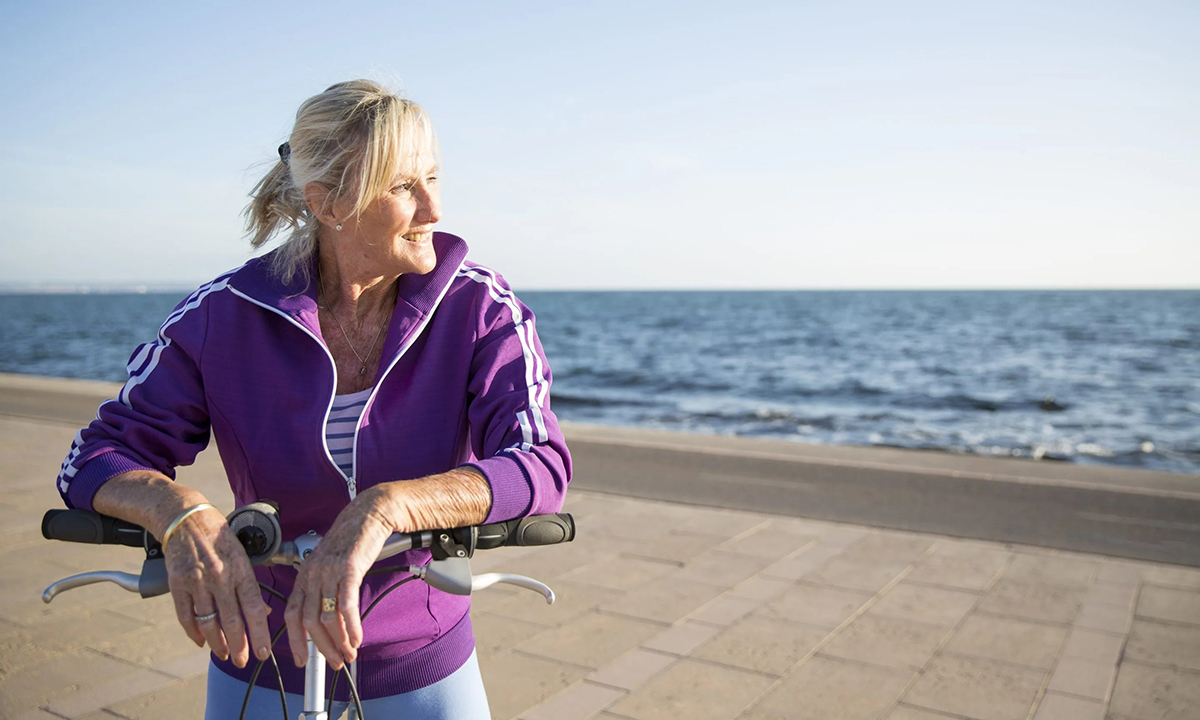
或许你之前就听说过“积极老龄化”一词,但它到底是什么意思呢?是不是必须每天都去健身房锻炼,或者每个周末都要去徒步旅行?
完全不是这样。根据世界卫生组织(World Health Organization)的说法,积极老龄化包括一系列能够让你的思想、身体、情感和精神得到满足的追求,与年龄大小、健康状况或者社会经济地位高低无关。积极老龄化还意味着你需要关心自己的健康和福祉。
国际积极老龄化理事会(International Council on Active Aging)的创始人及首席执行官科林·米尔纳表示,按照积极老龄化的原则生活,有助于我们延年益寿、提升生活品质。“‘人’是身心统一的整体,身体活动只是其中一个方面。社会联系、脑力活动同样十分重要。”
如何成为“积极老龄化”的践行者
保持积极心态
要想实现“积极老龄化”,首先就要对变老保持积极的态度。耶鲁大学(Yale University)的心理学家贝卡·利维等人的研究发现,以消极的心态面对衰老会使个人预期寿命缩短7.5年。另有研究发现,面对衰老的积极心态与更健康的体魄之间存在正向联系,比如不仅可以降低我们罹患心脏病、糖尿病和癌症的风险,还能够改善睡眠质量。
参与社交活动
根据美国老年医学会(The American Geriatrics Society)的报告,经常与家人和朋友交流的老年人(无论面对面交流还是通过网络交流),寿命一般更长,患抑郁症的风险也更低。相反,孤身独居会增加健康恶化的风险。
参与社会事务
世界卫生组织报告称,无论老人身体或认知状况如何,参与文化、社会、经济和公民事务均有助于提升其健康水平,让其可以更健康地变老。许多活动,例如在社区做义工、参与代际活动(比如辅导学生、为儿童读书、参加家庭聚会)、参加政治事务,甚至为邻居提供帮助,都能够提升老人的满足感,让他们觉得生活更有意义。
坚持健康的生活习惯
罗切斯特大学(University of Rochester)的老年医学专家、医学教授苏珊·弗里德曼博士称,我们年轻时的生活习惯(饮食偏好,是否饮酒、抽烟等)是晚年积极老龄化的基础。弗里德曼指出,医学专家们越发清醒地认识到,生活方式对健康衰老确实会产生影响。
弗里德曼说:“不过我们要清楚一点,那就是即便患有慢性疾病或身有残疾,我们仍然可以过上积极、健康、快乐、充实的生活”。此外,无论何时,改换更健康的生活方式都不晚,仍然能够帮助我们减轻疾病影响,延长寿命。
保持好奇心
专家称,脑力活动与运动、社交带来的刺激同等重要。通过参与一些有益于大脑健康的活动,例如上课、演奏音乐、阅读陌生领域的书籍或者学习新技能,我们可以让大脑保持活力,让神经元处于兴奋状态。
保持冷静
老年人要管理的压力与焦虑情绪(与年轻人)有所不同。《哈佛健康杂志》(Harvard Health)的专家称,进入老年后,我们会遇到一些新的压力,比如亲人的离世、财务状况的变化、生活因为退休而变得没有那么规律及身体机能的下降等。我们能够通过一些非药物的方法来更好应对生活中的起起伏伏,例如锻炼、深呼吸、正念或者冥想,以及更多社会和心理健康方面的支持。
其他有助于长寿的因素
弗里德曼说,虽然生物与遗传特质、收入水平、教育程度和医疗资源丰富度等因素对我们能否健康长寿具有重要影响,但每个人,无论具体状况如何,都可以通过积极的生活方式来迎接衰老的过程。
通过合理运动、控制饮食、保持社交、减轻压力、避免接触烟草等有害健康的物质,多管齐下,我们更有可能让自己健康变老。她说:“生活方式越健康,我们就能够过得越好。”
外界因素
虽然个人必须主动作为,但医疗保健系统、政府和政策制定者也需要为促进健康的老年生活创造条件。麦肯锡全球研究所(McKinsey Global Institute)在2020年发布的一份报告认为,我们应该更多地把健康和老龄化视为经济、社会领域的投资,而不是经济或者社会安全网的负担。
该报告指出:“长期的预防、保健工作不能只靠医务工作者或者医疗保健系统来完成,而是需要每个人的努力。”在个人层面,如果我们可以给予自己的健康和衰老情况更多关心,我们就能够减轻自己给医疗系统造成的负担,也可以对经济做出更多的贡献。
米尔纳认为,无论生活在哪里,也无论具体的生活方式或者健康状况如何,每个人都能够成为积极老龄化的践行者。他说:“即便你长期需要他人照看,也可以让生活过得更为精彩。这样就能够让自己过得更幸福,也更容易长寿。”
“积极老龄化”一词并没有严格定义,只是要尽可能地全身心投入其中,“我们不一定要爬上山巅,但还是要迈出第一步。”弗里德曼说道。(财富中文网)
译者:梁宇
审校:夏林
或许你之前就听说过“积极老龄化”一词,但它到底是什么意思呢?是不是必须每天都去健身房锻炼,或者每个周末都要去徒步旅行?
完全不是这样。根据世界卫生组织(World Health Organization)的说法,积极老龄化包括一系列能够让你的思想、身体、情感和精神得到满足的追求,与年龄大小、健康状况或者社会经济地位高低无关。积极老龄化还意味着你需要关心自己的健康和福祉。
国际积极老龄化理事会(International Council on Active Aging)的创始人及首席执行官科林·米尔纳表示,按照积极老龄化的原则生活,有助于我们延年益寿、提升生活品质。“‘人’是身心统一的整体,身体活动只是其中一个方面。社会联系、脑力活动同样十分重要。”
如何成为“积极老龄化”的践行者
保持积极心态
要想实现“积极老龄化”,首先就要对变老保持积极的态度。耶鲁大学(Yale University)的心理学家贝卡·利维等人的研究发现,以消极的心态面对衰老会使个人预期寿命缩短7.5年。另有研究发现,面对衰老的积极心态与更健康的体魄之间存在正向联系,比如不仅可以降低我们罹患心脏病、糖尿病和癌症的风险,还能够改善睡眠质量。
参与社交活动
根据美国老年医学会(The American Geriatrics Society)的报告,经常与家人和朋友交流的老年人(无论面对面交流还是通过网络交流),寿命一般更长,患抑郁症的风险也更低。相反,孤身独居会增加健康恶化的风险。
参与社会事务
世界卫生组织报告称,无论老人身体或认知状况如何,参与文化、社会、经济和公民事务均有助于提升其健康水平,让其可以更健康地变老。许多活动,例如在社区做义工、参与代际活动(比如辅导学生、为儿童读书、参加家庭聚会)、参加政治事务,甚至为邻居提供帮助,都能够提升老人的满足感,让他们觉得生活更有意义。
坚持健康的生活习惯
罗切斯特大学(University of Rochester)的老年医学专家、医学教授苏珊·弗里德曼博士称,我们年轻时的生活习惯(饮食偏好,是否饮酒、抽烟等)是晚年积极老龄化的基础。弗里德曼指出,医学专家们越发清醒地认识到,生活方式对健康衰老确实会产生影响。
弗里德曼说:“不过我们要清楚一点,那就是即便患有慢性疾病或身有残疾,我们仍然可以过上积极、健康、快乐、充实的生活”。此外,无论何时,改换更健康的生活方式都不晚,仍然能够帮助我们减轻疾病影响,延长寿命。
保持好奇心
专家称,脑力活动与运动、社交带来的刺激同等重要。通过参与一些有益于大脑健康的活动,例如上课、演奏音乐、阅读陌生领域的书籍或者学习新技能,我们可以让大脑保持活力,让神经元处于兴奋状态。
保持冷静
老年人要管理的压力与焦虑情绪(与年轻人)有所不同。《哈佛健康杂志》(Harvard Health)的专家称,进入老年后,我们会遇到一些新的压力,比如亲人的离世、财务状况的变化、生活因为退休而变得没有那么规律及身体机能的下降等。我们能够通过一些非药物的方法来更好应对生活中的起起伏伏,例如锻炼、深呼吸、正念或者冥想,以及更多社会和心理健康方面的支持。
其他有助于长寿的因素
弗里德曼说,虽然生物与遗传特质、收入水平、教育程度和医疗资源丰富度等因素对我们能否健康长寿具有重要影响,但每个人,无论具体状况如何,都可以通过积极的生活方式来迎接衰老的过程。
通过合理运动、控制饮食、保持社交、减轻压力、避免接触烟草等有害健康的物质,多管齐下,我们更有可能让自己健康变老。她说:“生活方式越健康,我们就能够过得越好。”
外界因素
虽然个人必须主动作为,但医疗保健系统、政府和政策制定者也需要为促进健康的老年生活创造条件。麦肯锡全球研究所(McKinsey Global Institute)在2020年发布的一份报告认为,我们应该更多地把健康和老龄化视为经济、社会领域的投资,而不是经济或者社会安全网的负担。
该报告指出:“长期的预防、保健工作不能只靠医务工作者或者医疗保健系统来完成,而是需要每个人的努力。”在个人层面,如果我们可以给予自己的健康和衰老情况更多关心,我们就能够减轻自己给医疗系统造成的负担,也可以对经济做出更多的贡献。
米尔纳认为,无论生活在哪里,也无论具体的生活方式或者健康状况如何,每个人都能够成为积极老龄化的践行者。他说:“即便你长期需要他人照看,也可以让生活过得更为精彩。这样就能够让自己过得更幸福,也更容易长寿。”
“积极老龄化”一词并没有严格定义,只是要尽可能地全身心投入其中,“我们不一定要爬上山巅,但还是要迈出第一步。”弗里德曼说道。(财富中文网)
译者:梁宇
审校:夏林
You may have heard the term “active aging,” but what does it really mean? Do you have to hit the gym every day, or hike every weekend?
Not at all. Active aging includes a wide range of pursuits that keep your mind, body, emotions and spirit engaged, regardless of age, health or socioeconomic status, according to the World Health Organization (WHO). It also means being diligent about your own health and well-being.
Following the principles of active aging can help extend longevity and quality of life, according to Colin Milner, founder and CEO of the International Council on Active Aging. “Physical activity is just one of the many elements that makes up a person. “It’s just as important that we are socially connected and that we are intellectually active.”
How to be an active ager
Stay positive
Active aging starts with having a positive attitude about getting older. Research by Yale psychologist Becca Levy and others have found that negative attitudes about aging can trim 7.5 years off your life. Other studies find connections between positive attitudes about aging and better health, including lower risk of heart disease, diabetes, and cancer, as well as improved quality of sleep.
Stay connected
Older people with active social interactions with family and friends — whether in person or virtually — may live longer and reduce their risk of depression, according to The American Geriatrics Society. Conversely, being isolated or lonely increases the odds of poorer health.
Stay involved
Participation in cultural, social, economic, and civic affairs can also help foster wellness and healthier aging regardless of physical or cognitive status, the WHO reports. Activities like volunteering in the community, participating in intergenerational programs (think: tutoring, reading to children, family gatherings), political involvement, or even helping out a neighbor foster a sense of satisfaction and purpose.
Stay healthy at all ages and stages
Your early life behavior—including diet, alcohol and tobacco use—sets the stage for later-life active aging, according to Dr. Susan Friedman, a geriatrician and professor of medicine at the University of Rochester. Friedman points to a growing recognition among medical professionals that lifestyle really does make a difference in healthy aging.
“However, people should know they can live active, healthy, happy, productive lives, even with chronic disease or disability,” says Friedman. And, it’s never too late to adopt healthier behaviors, which can help minimize the effects of disease and extend longevity, she says.
Stay curious
Intellectual engagement is as important as physical and social stimulation, experts say. Efforts that promotes brain health, like taking a class, playing music, reading books about new subjects, or learning new skills, keeps the brain engaged and neurons firing.
Stay calm
Managing stress and anxiety as an older person is different. You may experience new types of stressors, like the loss of a loved one, a change in financial status or less structure in your day due to retirement, as well as physical changes, according to experts at Harvard Health. Exercise, deep breathing techniques, mindfulness or meditation, and increased social and mental health support are just some non-pharmacologic ways to help handle life’s ups and downs.
Other factors that contribute to longevity
While other factors like biology and genetics, income, education, and access to health care, play important roles in healthy longevity, everyone can take an active approach towards aging, regardless of their particular circumstances, Friedman says.
Building in multiple components—physical, dietary, social, stress reduction, and avoiding toxins like tobacco, means you’re more likely to foster your own healthy aging. “The more that we can take this lifecycle approach, the better off we’ll be,” she says.
Beyond the individual
While individuals must take the lead, health care systems, governments and policymakers must also create the means to foster healthy older age. A 2020 report from the McKinsey Global Institute, concluded that we should be thinking about health and aging more as an economic and social investment rather than a strain on the economy or safety net.
“Long-term prevention and health promotion cannot simply be left to healthcare providers or healthcare systems. It is quite literally everybody’s business,” the report said. At the individual level, people who are more engaged in their own health and aging reduce the burden on the healthcare system, and contribute more to the economy.
No matter where you live, or what your specific lifestyle and health situation is, anyone can be an active ager, according to Milner. “Even if you are in long term care, you can always squeeze the juice out of life. So that you can live better, longer, in that circumstance,” he says.
There are no hard and fast rules for active aging, except to engage your whole self as much as possible, says Friedman. “You don’t have to climb the mountain. You just have to take that first step.”






